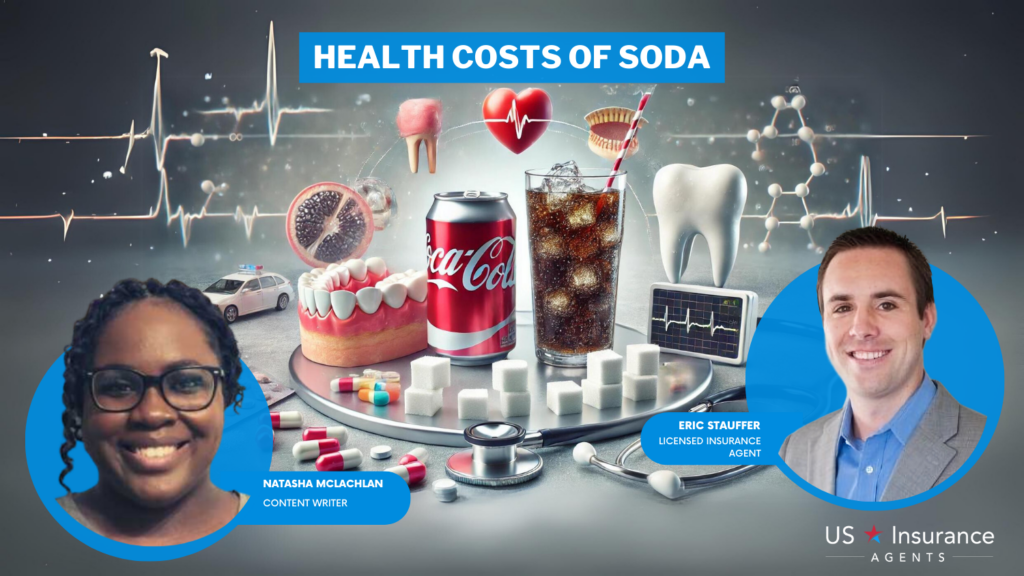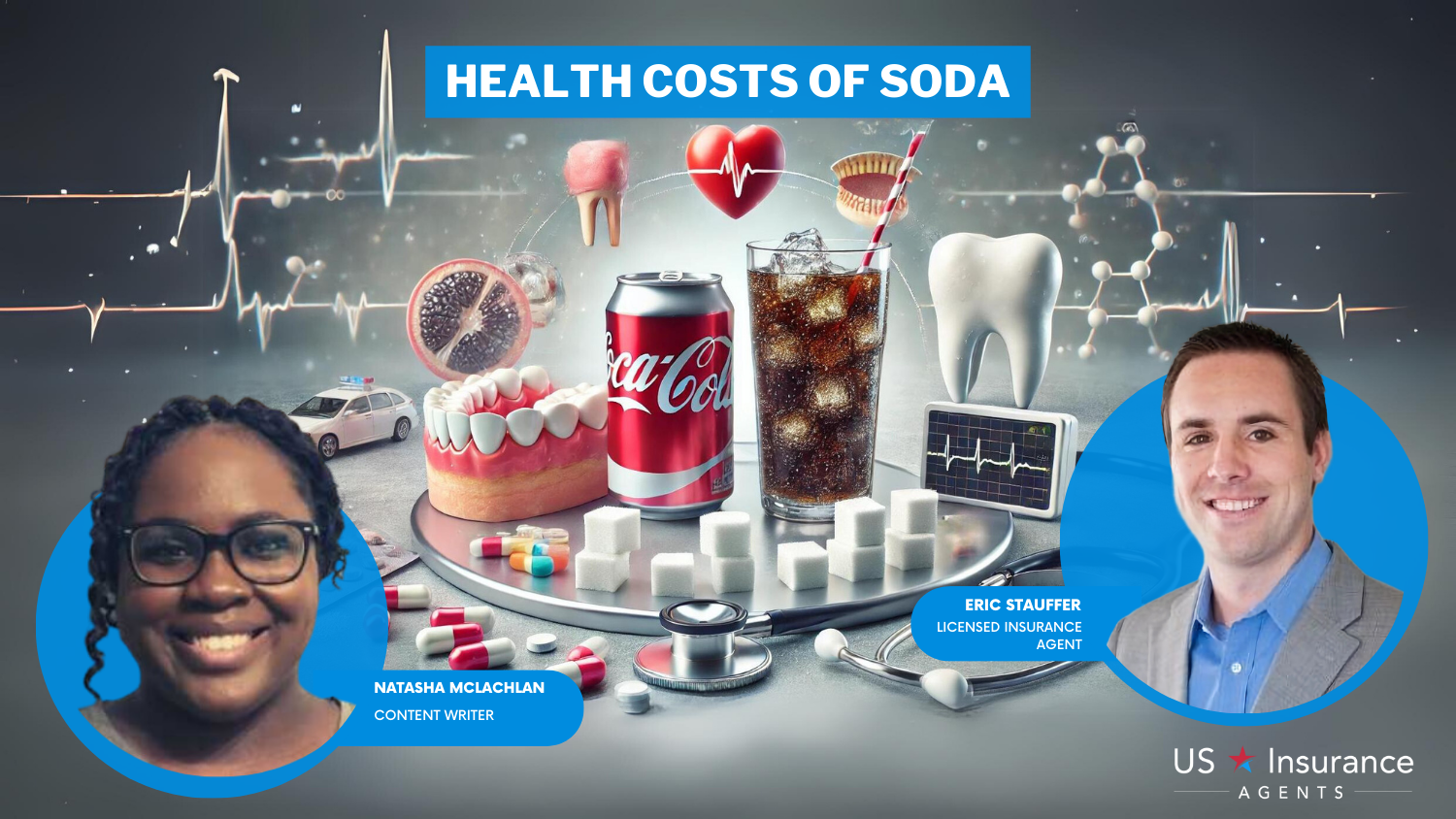Health Costs of Soda
Discover the detrimental effects of excessive soda consumption on your health, including increased risk of obesity, diabetes, and dental issues. Gain valuable insights into the hidden sugars, artificial additives, and empty calories present in soda. We also provide you with a range of healthier beverage alternatives to help you make positive choices for your well-being. Prioritize your health and make informed decisions about your beverage consumption.
Read more Secured with SHA-256 Encryption






Table of Contents
Table of Contents


Insurance and Finance Writer
Natasha McLachlan is a writer who currently lives in Southern California. She is an alumna of California College of the Arts, where she obtained her B.A. in Writing and Literature. Her current work revolves around insurance guides and informational articles. She truly enjoys helping others learn more about everyday, practical matters through her work.
Natasha McLachlan


Sr. Director of Content
Sara Routhier, Senior Director of Content, has professional experience as an educator, SEO specialist, and content marketer. She has over 10 years of experience in the insurance industry. As a researcher, data nerd, writer, and editor, she strives to curate educational, enlightening articles that provide you with the must-know facts and best-kept secrets within the overwhelming world of insurance....
Sara Routhier


Licensed Insurance Agent
Eric Stauffer is an insurance agent and banker-turned-consumer advocate. His priority is educating individuals and families about the different types of insurance coverage. He is passionate about helping consumers find the best coverage for their budgets and personal needs. Eric is the CEO of C Street Media, a full-service marketing firm and the co-founder of ProperCents.com, a financial educat...
Eric Stauffer
Updated October 2024
Welcome to our insightful exploration of the health costs of soda. Explore the health costs of soda in our informative article.

Discover the risks associated with excessive consumption, such as obesity, diabetes, and dental issues. Learn about hidden sugars and artificial additives.
To further prioritize your well-being, enter your zip code below and compare rates from the best insurance providers in your area. Take control of your health and ensure you have the coverage you need to safeguard your well-being.
Statistics
A typical 20-ounce soda bottle contains 16 teaspoons of sugar and 250 calories. To burn off these calories, the average adult would have to spend 45 minutes speed walking. Only one bottle per day is enough to exceed the allowed daily intake of added sugars. Research by the CDC found that approximately one-half of U.S. adults consume at least one sugar-sweetened beverage per day. There are differences between gender and age in soda consumption. Men consume more sugary beverages than women across all age groups. Young adults have a higher mean intake of sugar-sweetened beverages than older adults. This is something well-known to the beverage industry too, as they spend half a billion dollars yearly on marketing their products to children and teenagers much more than to any other group. For more information, visit:
- Center for Science in the Public Interest: Sugary drinks
- United States Department of Agriculture: Beverage choices of US adults
- Boston Public Health Commission: Sugar-sweetened beverages, obesity, and chronic disease
Free Health Insurance Comparison
Compare Quotes From Top Companies and Save
Secured with SHA-256 Encryption
Impact on Health
Continuous excessive consumption of soft beverages leads to higher risks of obesity, tooth decay, type 2 diabetes and heart disease, among other things.
Obesity
Sugary drinks are a major contributor to the obesity epidemic in the United States. Two out of three adults and one out of three children in the US are overweight and obese. Every year a large amount of money is spent treating obesity-related health issues in America. Our digestive system is not evolutionarily designed for drinking calories because sugary beverages are only a recent addition to human diets. There is a hormone called ghrelin in our stomach which lets us know when we’re hungry. When this hormone increases we feel hungry. When we eat, the hormone goes down. However, this only happens with solid food, not liquids. We can drink hundreds of calories, but this will not make us any more satiated, and it will not reduce the number of calories we consume in subsequent meals after the consumption of liquid calories. This means that all of the soda you consume during the day adds up to the total calorie intake, which may not look like much in the short-term, but it can lead to 40 pounds worth of excess caloric intake each year!
- Benioff Children’s Hospital: Sweet drinks and obesity
Teeth
There is a strong link between soda consumption and tooth decay. Sugar from soft drinks combines with bacteria in your mouth to form acid which attacks the teeth. Each new sip you take is another attack that lasts for about 20 minutes. Ongoing acid attacks, which happen if you consume sugary drinks continuously, can weaken tooth enamel. This is especially dangerous for kids and teens because their teeth are not fully developed. Tooth decay can be easily avoided by limiting intake of soft drinks, brushing and flossing teeth at least twice a day, and visiting your dentist’s office regularly.
- Wisconsin Dental Association: Sip all day, get decay
Diabetes
People whose sugary-sweetened beverages intake is at least 1-2 servings a day have a 26% greater risk of developing type 2 diabetes. Sugar-sweetened beverages raise blood glucose and insulin concentrations rapidly because they contain lots of easily absorbable carbohydrates such as sucrose and high-fructose corn syrup – which, according to the American Diabetes Association, can contribute to a high dietary glycemic load. High glycemic load diets are known to induce glucose intolerance and insulin resistance and can increase levels of inflammatory biomarkers, which are linked to type 2 diabetes risk.
Cancer
For many diseases, weight gain serves as a link between sugary beverages intake and the development of the disease. This is true for the above-mentioned diabetes, as well as cancer. Obesity has been known to cause nine types of cancer. Together with smoking and avoiding sugary drinks, maintaining a healthy weight important for reducing the risk of cancer.
- American Institute for Cancer Research: Sugary beverages and cancer risk
Heart Disease
Scientists have found evidence for the link between higher intake of added sugars, especially in the form of sugary drinks, and increased risk of hypertension, stroke, and coronary heart disease in adults.
- American Heart Association: Added sugars add to your risk of dying from heart disease
- Nutrition Evidence Library: What is the relationship between added sugars and risk of cardiovascular disease?
Asthma
A study by the National Center for Chronic Disease Prevention and Health Promotion has found that regular soda intake, independent of weight status, is associated with higher incidents of asthma among US high school students. The scientists have hypothesized that the relationship might be due to sodium benzoate found in soft drinks sold in the US.
Kidney Issues
Those who don’t consume sugary drinks are less likely to form kidney stones. Additionally, consuming beverages containing phosphoric acid (dark color beverages, such as Coca-Cola) has a worse effect on kidney health compared with drinking lighter colored sodas such as Sprite. Many physicians recommend that their patients avoid cola drinks as a method of prevention against kidney stones. The best recommendation for your overall health is to drink water instead of sugary drinks. It is a far cheaper, healthier, and more nutritious alternative.
- KidneyStoners.org: Does soda drinking cause kidney stones
Reproductive Issues
There are quite a few epidemiological studies investigating the association between soft drinks (especially cola drinks) consumption and reproductive issues. However, the results are still inconclusive, and the topic remains controversial. Caffeine and other chemical compounds found in cola beverages could potentially have adverse effects on fertility in persons consuming one or more liters of cola drinks per day.
- Scientific Research: Effect of cola intake on fertility: A review
Osteoporosis
Studies have shown that regular intake of beverages containing phosphoric acid has negative effects on bones. Some scientists hypothesize that high level of phosphoric acid may lead the body to turn to bones for calcium to neutralize acids. Others, on the other hand, have found no link between cola intake and bone health, and argue that phosphorus is a key component of bone minerals, just like calcium, and that there is no evidence its intake is bad for bone health.
- Go Ask Alice- Columbia University: Could drinking too much soda lead osteoporosis or kidney failure
- International Osteoporosis Foundation: Are carbonated sodas bad for your bones?
Gout
Overconsumption of sugary drinks, especially those that contain high-fructose corn syrup, can set off gout. As your body breaks down fructose, it releases components called purines. The breakdown of purines produces uric acid, which forms painful crystals in the joints and causes gout. According to the Arthritis Foundation, a 2008 study found that men who consume two or more sugary drinks per day have an 85 percent higher risk of gout than men who drink less than one soda a month.
Headaches
Many people who suffer from headaches report relief from pain after caffeine intake. This is due to the vasoconstrictive properties of caffeine – the ability to cause enlarged blood vessels to narrow and restrict blood flow. However, too much of anything can cause harm. Withdrawal from caffeine can lead to rebound headaches. Caffeine is found in certain types of soft drinks such as Mountain Dew, Coca-Cola, Dr. Pepper, Pepsi, and energy drinks.
- National Headache Foundation: Does caffeine trigger or treat headaches
Regular Soda vs. Diet Soda
Many people who want to reduce their sugar and caloric intake, but would still like to enjoy a sweet and refreshing drink, turn to diet soda. However, some researchers suggest that diet soda might be just as bad for your health as regular soda. For example, researchers from Columbia University observed that diet soda drinkers had 60 percent more strokes, heart attacks, and other attacks of blood vessel diseases than other participants in the study, even after controlling for smoking, diet, and physical activity. More research is needed to understand the health issues related to long-term diet soda consumption. So far, there is no clear evidence that diet soda is effective in preventing obesity and that continuous consumption does not lead to increased health risks.
- Purdue University: Diet drinks are not the sweet solution to fight obesity, health problems
- Tufts University: Regular intake of sugary beverages not of diet soda associated with prediabetes
- Mayo Clinic: I drink diet soda every day. Could this be harmful?
Other Carbonated Beverages vs. Soda
Even though sodas and energy drinks are bad for you, not all carbonated beverages are. There is a common misconception that carbonation causes health issues such as lack of calcium in the bones, erosion of tooth enamel, and irritation of the stomach. The truth is that carbonation is not harmful in itself. It is the other properties of soft and energy drinks that make them harmful to people’s health (primarily sugar, sodium, and caffeine). Different types of carbonated water are available on the market, so you should always read the label first to find out if the drink has any hidden sugars and sodium.
- Scripps: Are carbonated beverages harming your health?
- Harvard Health Publications: Does carbonated water harm bones?
Free Health Insurance Comparison
Compare Quotes From Top Companies and Save
Secured with SHA-256 Encryption
Additional Resources
- CATO has a great discussion on the potential benefit of soda taxes: Would soda taxes really yield health benefits?
- The Public Health Law Center also discussed the topic of drink taxation: Taxing sugar drinks
- The Journalist’s Resource also looks into the topic: Effect of prices on nutrition – comparing the impact of product and nutrient-specific taxes

Frequently Asked Questions
How does soda affect my weight?
Soda consumption has been linked to obesity due to the high sugar content in the beverages. Sugar-sweetened drinks are the leading source of calories and added sugars in the American diet.
Can soda cause tooth decay?
Yes, soda consumption is strongly linked to tooth decay. The sugar in soda combines with bacteria in the mouth to form acid that attacks the teeth, and ongoing acid attacks can weaken tooth enamel.
Does soda increase the risk of diabetes?
Yes, drinking sugary drinks increases the risk of developing type 2 diabetes. People who consume at least one to two servings of sugar-sweetened beverages per day have a 26% greater risk of developing diabetes.
Is there a link between soda consumption and cancer?
Sugary drinks consumption can cause weight gain, which is a risk factor for cancer. Obesity is known to cause nine types of cancer. Maintaining a healthy weight is important for reducing the risk of cancer.
Does drinking diet soda have the same health risks as regular soda?
While diet soda does not contain the same amount of sugar and calories as regular soda, it has been linked to health risks such as an increased risk of stroke, dementia, and metabolic syndrome. Drinking water or other low-sugar beverages is a better option for overall health.
Can drinking soda affect fertility?
Studies suggest that excessive consumption of soda may affect reproductive health in both men and women. Soda consumption has been linked to decreased sperm count in men and decreased fertility in women.
Get a FREE Quote in Minutes
Insurance rates change constantly — we help you stay ahead by making it easy to compare top options and save.








